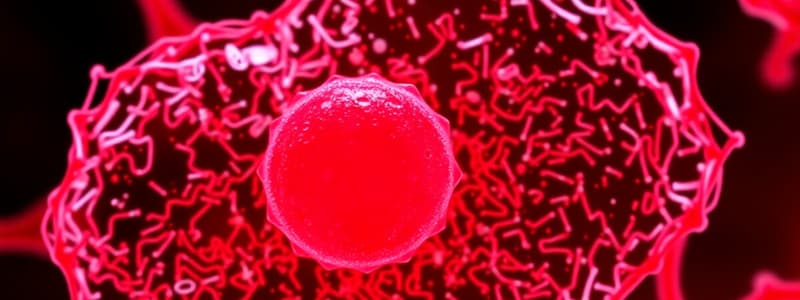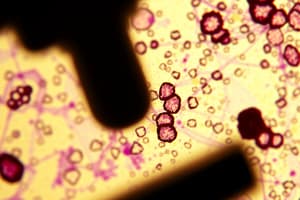Podcast
Questions and Answers
What is the primary function of stem cells in embryos?
What is the primary function of stem cells in embryos?
- To produce blood cells
- To undergo mitosis
- To support plant growth
- To give rise to many different types of cells (correct)
Stem cells from adult bone marrow can only produce blood cells.
Stem cells from adult bone marrow can only produce blood cells.
False (B)
What important role does mitosis play in multicellular organisms?
What important role does mitosis play in multicellular organisms?
Growth and development
In therapeutic cloning, an embryo is produced with the same ______ as the patient.
In therapeutic cloning, an embryo is produced with the same ______ as the patient.
Match the following types of stem cells with their origin:
Match the following types of stem cells with their origin:
Which of the following cell types is characterized by having a nucleus?
Which of the following cell types is characterized by having a nucleus?
Bacterial cells have their genetic material enclosed in a nucleus.
Bacterial cells have their genetic material enclosed in a nucleus.
What is the function of mitochondria in animal cells?
What is the function of mitochondria in animal cells?
Plant cells contain __________ for photosynthesis.
Plant cells contain __________ for photosynthesis.
Match the cell parts with their functions:
Match the cell parts with their functions:
What is a key difference between eukaryotic and prokaryotic cells?
What is a key difference between eukaryotic and prokaryotic cells?
Describe one function of the cell wall in plant cells.
Describe one function of the cell wall in plant cells.
What structure is responsible for producing energy in cells?
What structure is responsible for producing energy in cells?
Only animal cells can differentiate into specialized cells.
Only animal cells can differentiate into specialized cells.
What is the primary function of the nucleus in a cell?
What is the primary function of the nucleus in a cell?
The process by which a cell becomes specialized for a specific function is called ______.
The process by which a cell becomes specialized for a specific function is called ______.
Which of the following types of cells retains the ability to differentiate throughout life?
Which of the following types of cells retains the ability to differentiate throughout life?
Match the following cell types with their functions:
Match the following cell types with their functions:
Light microscopes have a higher magnification power compared to electron microscopes.
Light microscopes have a higher magnification power compared to electron microscopes.
What is the formula used to calculate magnification?
What is the formula used to calculate magnification?
The main function of chloroplasts in plant cells is ______.
The main function of chloroplasts in plant cells is ______.
What is one key role of plasmids in bacterial cells?
What is one key role of plasmids in bacterial cells?
Flashcards
Eukaryotic Cell
Eukaryotic Cell
A cell with a nucleus and other membrane-bound organelles.
Prokaryotic Cell
Prokaryotic Cell
A cell without a nucleus or other membrane-bound organelles. e.g. bacteria
Cell Membrane
Cell Membrane
A thin layer that surrounds the cell and controls what enters & leaves
Cytoplasm
Cytoplasm
Signup and view all the flashcards
Mitochondria
Mitochondria
Signup and view all the flashcards
Plant cell structures
Plant cell structures
Signup and view all the flashcards
Cell Wall
Cell Wall
Signup and view all the flashcards
Cell Cycle Stages
Cell Cycle Stages
Signup and view all the flashcards
Mitosis
Mitosis
Signup and view all the flashcards
Stem Cell
Stem Cell
Signup and view all the flashcards
Stem Cell Uses
Stem Cell Uses
Signup and view all the flashcards
Stem Cell Risks
Stem Cell Risks
Signup and view all the flashcards
Cell Differentiation
Cell Differentiation
Signup and view all the flashcards
Cell Specialization
Cell Specialization
Signup and view all the flashcards
Subcellular structures
Subcellular structures
Signup and view all the flashcards
Magnification
Magnification
Signup and view all the flashcards
Electron Microscope
Electron Microscope
Signup and view all the flashcards
Relating Structure & Function
Relating Structure & Function
Signup and view all the flashcards
Cell division (Mitosis)
Cell division (Mitosis)
Signup and view all the flashcards
Microscopy Techniques
Microscopy Techniques
Signup and view all the flashcards
Chromosomes
Chromosomes
Signup and view all the flashcards
Cell Cycle
Cell Cycle
Signup and view all the flashcards
Study Notes
Year 9 Science Independent Learning Revision
- Homework Schedule: Revision tasks are assigned weekly, with due dates. Students should choose one activity per week to revise specific topics.
- Revision Topics: Topics include cell structure, cell division (including stem cells and microscopy), atoms, elements, and compounds, scientific models of the atom (including the Plum Pudding model), energy stores and changes.
- Revision Techniques: Students can use various methods like mind maps, flash cards, question/answer cards, Cornell notes, and knowledge organizers.
- Further Resources: Seneca Learning provides additional revision tasks to complete before assessments.
Cell Biology (AP1 Year 9 AQA GCSE Science)
- Eukaryotes vs. Prokaryotes: Plant and animal cells (eukaryotic) have a cell membrane, cytoplasm, and genetic material in a nucleus; bacterial cells (prokaryotic) are smaller, with a cell membrane, cytoplasm, a cell wall, and genetic material as a single DNA loop (and possibly plasmids).
- Cell Parts: Animal cells have a nucleus, cytoplasm, cell membrane, mitochondria, and ribosomes. Plant cells have these plus chloroplasts and a permanent vacuole, and a cell wall.
- Cell Specialization: Cells differentiate to perform specific functions. In animals, most differentiation occurs early on, while plants can differentiate throughout their life.
- Microscopy: Electron microscopes offer higher magnification and resolution than light microscopes, revealing more subcellular structures. Calculations for magnification (image size/real size) are crucial.
- Cell Division (Mitosis): The cell cycle doubles genetic material then splits the duplicated material into two identical cells.
- Stem Cells: Stem cells are undifferentiated cells capable of specializing into various cell types. They're found in embryos, bone marrow, and plant meristems. Therapeutic cloning aims to produce stem cells with the same genes as the patient, while stem cells can be used for cloning rare or commercially valuable plants.
- Ethical Considerations: Stem cell research has ethical and religious implications, alongside practical risks.
Studying That Suits You
Use AI to generate personalized quizzes and flashcards to suit your learning preferences.




